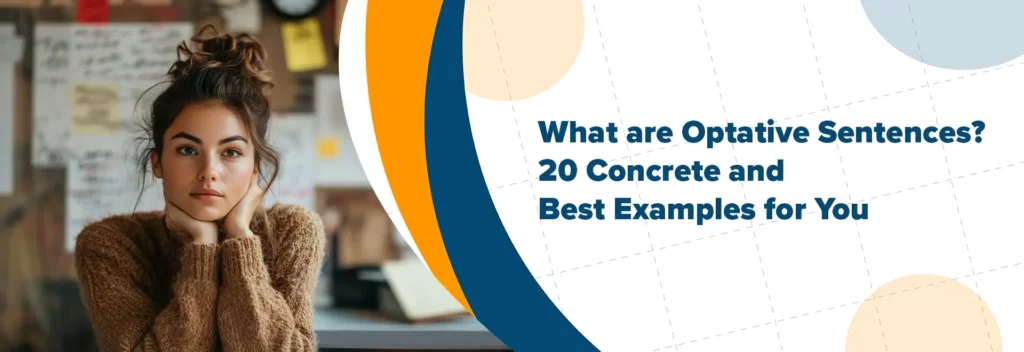
What are Optative Sentences?
English grammar and forming correct sentences are parts of language learning. We have been taught a lot about verb forms, sentence structures, and vocabulary use since we were young. We learned a lot about the grammar and how to write sentences correctly including the proper use of punctuations and capitalization.
We know that the primary types of sentences are declarative, interrogative, imperative, and exclamatory. However, there are other sorts of sentences such as the conditional and optative sentences.
What are optative sentences?
Have you ever found yourself wanting more than just a simple statement to express your desires, hopes, or even frustrations, but don’t know how to do it? The world of optative sentences can help you express your emotions that you want to convey.

Sometimes, we just don’t notice that what we utter based on our emotions is in the optative mood. Say for example the sentence “I wish I was a bird so I can be free”. If you say it normally, it’s just a sentence and nothing else. However, if you think about it more deeply, this wish is an example of an optative sentence.
Optative sentences are sentences that express our wishes and desires according to our mood. They can be positive or negative. Optative sentences can be used as a wish, a prayer, a desire, or a curse. In the optative sentence, we normally use the words “may, long, and wish” to express our feelings and thoughts.
If you are not yet familiar with optative sentences, this article is intended for you. We will give you examples and give you more insights on how they are formed.
The Structure of Optative Sentences
Just like any other sentences, optative sentences also follow a structure. When expressed in writing, we use the full stop (.) and the exclamatory mark (!) to express our emotions and desires.
May/+ N/P+V-1 + Others
May God bless you with abundance in life.
Long+ V-1+N/P + Others
Long live the king!
Wish+ N/P+ Others
I wish you good luck in your future endeavors.
Optative Sentences in Reported Speech
Optative sentences can be used as a direct or indirect speech. Below are examples of optative sentences in reported speech.
Direct Speech: “May the farmers have a bountiful harvest,” the president said.
Indirect Speech: The president wished the farmers might have a bountiful harvest.
Direct Speech: My friend whispered, “Wish you the very best in your career.”
Indirect Speech: My friend wished me the very best in my career.
Direct Speech: The woman shouted to the man, “May you die in pain all through your life!”
Indirect Speech: The woman cursed that the man might die in pain all through his life.
Other structures of optative sentences
- Optative sentences can also start with the word “let” that introduces a wish for something.
Let there be light in the world.
- They can also start with “have” to wish someone for something.
Have a wonderful day!
- They can start with “hope” in the sentence.
Hope to see you again soon.
- Other optative sentences embed the optative marker in the sentences.
All the best!
Best of luck!

Common daily expressions in the optative mood
The most common scenario where wishes and hopes happen in Christmas time or in special occasions. During this time, we hear a lot of Christmas and new year wishes from our friends and family. In some other situations, we also hear people wish us good luck or hope for our betterment. Below are some of the common expressions we use in our conversations.
- May you have a happy birthday!
- Long live the queen!
- Have a blessed Sunday!
- Have a safe flight!
- May you get what you want in life.
- Let there be peace on earth.
- Wish you a good life.
- Let love dominate your hearts.
- May your hearts be filled with so much joy and love.
- Have a merry Christmas and a happy new year!
- May he rest in peace.
- Wishing you a prosperous new year.
- Hope you’re doing fine today.
- May his soul rest in peace.
- Let there be love.
- Good luck!
- I pray that your family be blessed with abundance.
- God bless us all!
- Hope you die of hunger!
- I wish you good health.
We usually use optative sentences in our daily conversations and they have been present in our lives, but we sometimes don’t realize that they are a particular type of sentences with a specific purpose.
Why Optative sentences matter?
There are several reasons why optative sentences are important, especially when you are learning the English language. Below are the top three reasons why they matter.
- Learning optative sentences make you understand the language well, particularly the meaning and purpose of the sentence you utter. If you don’t understand how they work, your intention might be misinterpreted or misunderstood by your listener.
- Optative sentences help learners think better when constructing sentences. They are able to differentiate the exclamatory and optative sentences.
Example:
Exclamatory: Ouch! You stepped on my foot!
Optative: May you suffer the same fate as me!
- We can confidently and easily express our desires and emotions, as well as build connections with others. Optative sentences provide way to communicate our hopes, wishes, dreams, and even fears.
Learning optative sentences is important for language learners to develop their language skills and enhance their abilities to use appropriate words in sentences, as well as express their thoughts and feelings in a proper manner.
Challenge Time!
Tell whether the sentence is an optative sentence, a declarative, or an exclamatory sentence.
- I may be small, but I can give you a good fight.
- May your sister be blessed with a healthy baby.
- Let me do the dishes.
- The princess lived longer than expected.
- Hope you are fine today.
- Have a happy weekend!
- Oh my God! I won the lottery!
- May we achieve our goal for this quarter.
- I pray that your mom gets well soon.
- I wish you become a crow and will never come back as human!




